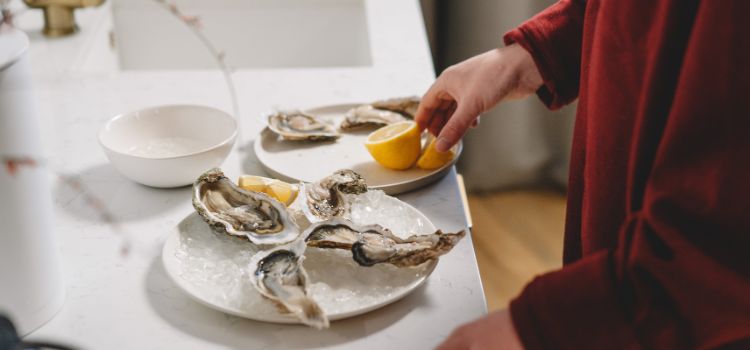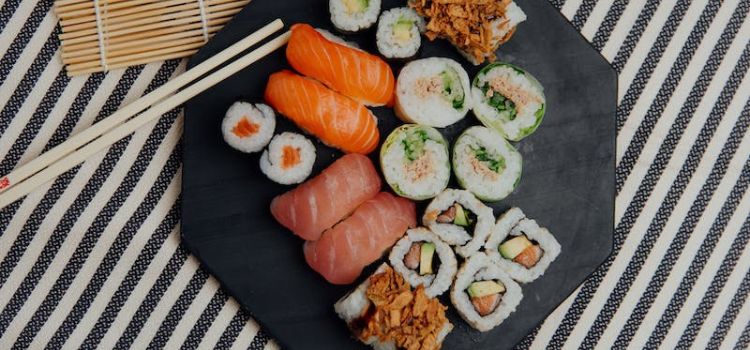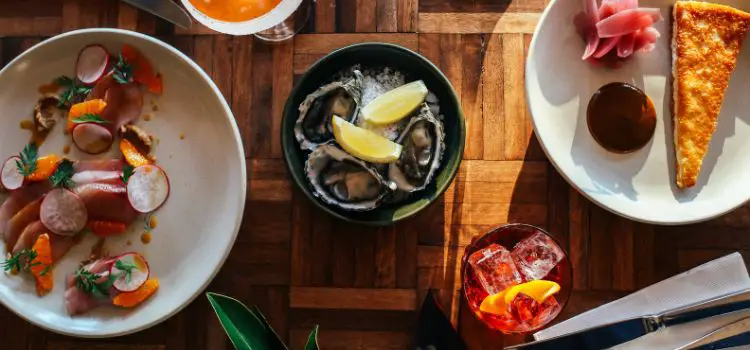Yes, it is safe to eat raw oysters while breastfeeding as long as there are no allergies for the mother or baby. Oysters can be a good source of protein, healthy fats, and vitamins and minerals in your diet while breastfeeding, which can benefit both you and your baby’s development.

However, it is important to ensure that the oysters are fresh and properly handled to minimize the risk of foodborne illnesses. So, if you enjoy raw oysters, there is no need to avoid them while breastfeeding, as long as you take necessary precautions.
Safety Of Eating Raw Seafood While Breastfeeding
Raw oysters can be safely consumed while breastfeeding, as long as there are no allergies for the mother or baby. Oysters are a good source of protein, healthy fats, and vitamins and minerals that can aid in inflammation reduction and support the baby’s nervous system development.
Many women wonder if it is safe to eat sushi and other raw seafood while breastfeeding. Here, we will explore the research on the topic to provide you with the information you need to make an informed decision.
Is It Safe To Eat Sushi And Other Raw Seafood While Breastfeeding?

- Raw seafood, such as sushi, oysters, clams, and mussels, is generally safe to consume while breastfeeding.
- There is no need to forgo these types of seafood, as long as you take some precautions.
- The FDA advises breastfeeding women to choose seafood that is low in mercury to minimize any potential risks.
Precautions To Consider:
- Avoid high-mercury seafood: Larger fish, such as swordfish, tuna, shark, king mackerel, and tilefish, tend to have higher levels of mercury. Opt for smaller fish like sardines and scallops, which generally contain less mercury.
- Look for reputable sources: Make sure to purchase seafood from trusted sources that follow proper safety and handling guidelines.
- Ensure it’s fresh: Raw seafood should always be fresh to minimize the risk of bacterial contamination. Check for any unusual smells or signs of spoilage before consuming.
Benefits Of Eating Sushi And Raw Seafood While Breastfeeding:
- Nutritional value: Raw seafood is a good source of omega-3 fatty acids, which are beneficial for both you and your baby’s brain development.
- Variety of nutrients: Sushi and other raw seafood also provide essential nutrients like protein, vitamins, and minerals.
- Flavorful and enjoyable: Eating sushi and raw seafood can be a pleasurable dining experience, allowing you to indulge in a wide range of flavors and textures.
While the general consensus is that eating raw seafood while breastfeeding is safe, it is always recommended to consult with your healthcare provider to ensure it aligns with your individual health needs and circumstances.
Remember to enjoy your meals in moderation and prioritize the safety and well-being of both you and your baby.
Guidelines For Consuming Seafood While Breastfeeding

When it comes to seafood consumption while breastfeeding, it’s important to be aware of certain guidelines to ensure the safety of both you and your baby. Here are some key points to keep in mind:
What seafood should be avoided while breastfeeding?
- Larger fish that have lived longer, such as swordfish, tuna, shark, king mackerel, and tilefish, have the highest levels of mercury due to their longer exposure. It is recommended to avoid these types of fish as they can pose risks to your baby’s development.
Understanding the levels of mercury in different types of fish:
- Smaller fish, like sardines and scallops, generally contain lower levels of mercury compared to larger fish. These smaller fish pose less risk and can be safely consumed while breastfeeding. It’s important to note that moderation is key, even when consuming fish with lower mercury levels.
Smaller fish with lower mercury levels that can be consumed while breastfeeding:
- Sardines: Sardines are a great source of omega-3 fatty acids and protein. They are low in mercury and can provide essential nutrients for both you and your baby.
- Scallops: Scallops are a delicious and nutritious choice. They are low in mercury and high in protein, vitamin B12, and minerals such as zinc and iron.
- Salmon: Salmon is an excellent source of omega-3 fatty acids, which are crucial for your baby’s brain and eye development. Opt for wild-caught salmon over farmed salmon whenever possible, as it contains fewer contaminants.
- Shrimp: Shrimp is a low-mercury seafood option that is rich in protein. It is also a good source of vitamins and minerals, including selenium, which supports the immune system.
- Anchovies: Anchovies are small, oily fish that are low in mercury. They are packed with omega-3 fatty acids, calcium, and iron, making them a nutritious choice for breastfeeding moms.
Remember, when consuming seafood while breastfeeding, it’s important to prioritize variety and balance in your diet. By choosing seafood options with lower mercury levels, you can safely enjoy the benefits of these nutrient-rich foods while nourishing your baby.
Benefits Of Including Oysters In A Breastfeeding Diet

Including oysters in a breastfeeding diet can provide essential nutrients such as protein, healthy fats, vitamins, and minerals that can aid in reducing inflammation and support the development of the baby’s nervous system.
As long as there are no allergies for the mother or baby, oysters can be a safe and beneficial addition to a breastfeeding diet.
Oysters are not only delicious but also packed with essential nutrients that can benefit both breastfeeding moms and their babies. Let’s explore some of the key benefits of including oysters in a breastfeeding diet:
Oysters As A Source Of Protein, Healthy Fats, Vitamins, And Minerals:
- Oysters are an excellent source of high-quality protein, which is essential for the growth and development of both mom and baby.
- They are rich in omega-3 fatty acids, which are important for brain development and function.
- Oysters are also packed with vitamins and minerals such as vitamin B12, zinc, iron, and selenium, all of which are crucial for maintaining optimal health during breastfeeding.
- These nutrients are known to support the immune system, boost energy levels, and aid in postpartum recovery.
The Role Of Nutrients In Reducing Inflammation And Supporting Baby’S Nervous System Development:
- Oysters contain anti-inflammatory compounds like omega-3 fatty acids and vitamin B12, which can help reduce inflammation in the body.
- Omega-3 fatty acids have been found to have a positive impact on the nervous system development of infants, including cognitive development and visual acuity.
- Vitamin B12 plays a crucial role in the healthy function of the nervous system and can contribute to the overall well-being of both mom and baby during breastfeeding.
Including oysters in your breastfeeding diet can provide an array of health benefits for both you and your baby. These nutrient-rich shellfish can be a delicious and nutritious addition to your meals, helping to support your postpartum health and the optimal development of your little one.
Just ensure that the oysters are fresh, properly cooked, and sourced from reputable suppliers to minimize any potential risks.
Frequently Asked Questions
Can You Eat Raw Oyster While Breastfeeding?
Yes, you can eat raw oysters while breastfeeding as long as there are no allergies for the mother or baby.
Can You Eat Other Raw Seafoods While Breastfeeding?
Yes, you can eat other raw seafoods while breastfeeding as long as there are no allergies for you or your baby.
What Seafood Should I Avoid While Breastfeeding?
Avoid high-mercury fish while breastfeeding, such as shark, swordfish, king mackerel, and tilefish. Opt for lower-mercury options like salmon, shrimp, and light tuna in moderation. Always consult with a healthcare provider for personalized advice.
Can You Eat Raw Oysters While Pregnant?
No, it is not safe to eat raw oysters while pregnant.
Conclusion
To conclude, while there are concerns about eating certain types of seafood during pregnancy, there is no need to forgo oysters when breastfeeding. As long as there are no allergies for the mother or baby, oysters can be a great source of protein, healthy fats, and vital vitamins and minerals.
These nutrients can aid in reducing inflammation and contribute to your baby’s nervous system development. It is essential to ensure that the oysters are cooked properly before consumption. Cooked oysters are safe to eat while breastfeeding as long as you and your baby do not have any allergies.
However, it is always recommended to consult with your healthcare provider or a lactation specialist to ensure the safety of consuming any specific food while breastfeeding. So, if you love oysters, there is no need to deprive yourself while you are breastfeeding, but do so responsibly and with caution.
Leave a Reply